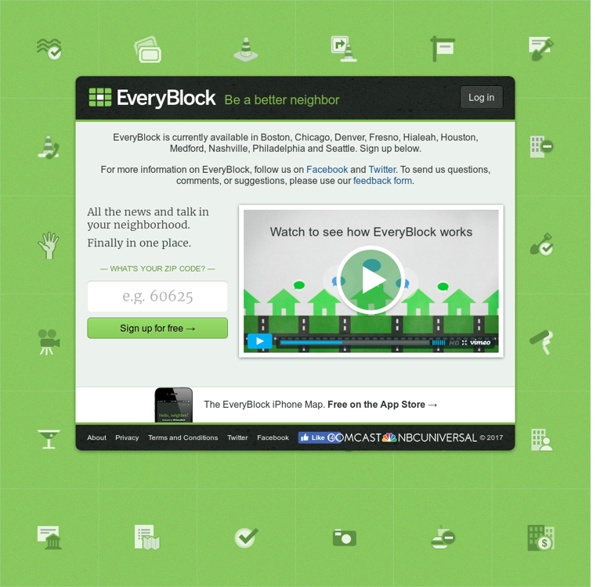



Hyperlocal Hyperlocal connotes information oriented around a well defined community with its primary focus directed toward the concerns of its residents. The term can be used as a noun in isolation or as a modifier of some other term (e.g. news). When used in isolation it refers to the emergent ecology of data (including textual content), aggregators, publication mechanism and user interactions and behaviours which centre on a resident of a location and the business of being a resident.
Publish2′s Ryan Sholin: “We did not set out to kill the Associated Press” This week, with much fanfare, Publish2 announced its News Exchange service. Using the new platform, CEO Scott Karp wrote, “newspapers can replace the AP’s obsolete cooperative with direct content sharing and replace the AP’s commodity content with both free, high-quality content from the Web and content from any paid source.” With the result being “a new efficient supply and distribution chain for high quality content brands.” The “obsolete cooperative.”
Become Data Literate in 3 Simple Steps Become Data Literate in 3 Simple Steps Just as literacy refers to “the ability to read for knowledge, write coherently and think critically about printed material” data-literacy is the ability to consume for knowledge, produce coherently and think critically about data. Data literacy includes statistical literacy but also understanding how to work with large data sets, how they were produced, how to connect various data sets and how to interpret them. Poynter’s News University offers classes of Math for journalists, in which reporters get help with concepts such as percentage changes and averages. Interestingly enough, these concepts are being taught simultaneously near Poynter’s offices, in Floridian schools, to fifth grade pupils (age 10-11), as the curriculum attests. That journalists need help in math topics normally covered before high school shows how far newsrooms are from being data literate.
Eucalyptus - 云服务环境 Elastic Utility Computing Architecture for Linking Your Programs To Useful Systems (Eucalyptus) 是一种开源的软件基础结构,用来通过计算集群或工作站群实现弹性的、实用的云计算。它最初是美国加利福尼亚大学 Santa Barbara 计算机科学学院的一个研究项目,现在已经商业化,发展成为了 Eucalyptus Systems Inc。不过,Eucalyptus 仍然按开源项目那样维护和开发。Eucalyptus Systems 还在基于开源的 Eucalyptus 构建额外的产品;它还提供支持服务。
The World Factbook People from nearly every country share information with CIA, and new individuals contact us daily. If you have information you think might interest CIA due to our foreign intelligence collection mission, there are many ways to reach us. If you know of an imminent threat to a location inside the U.S., immediately contact your local law enforcement or FBI Field Office. For threats outside the U.S., contact CIA or go to a U.S. Embassy or Consulate and ask for the information to be passed to a U.S. official.
tribune-company-makes-investment-in-journatic-148539645 CHICAGO, April 23, 2012 /PRNewswire/ -- Tribune Company today announced that it has made a strategic investment in Journatic, LLC, a provider of extensive local content to media companies and advertisers, and that the two companies will have a significant operating relationship going forward. Journatic will use the investment to expand its ability to meet the rapidly growing demand for its services from publishers, advertisers and agencies. Terms of the investment were not disclosed. Journatic enables publishers and advertisers to better serve their customers through the efficient creation of hyperlocal content, with a focus on "people", "places" and "events". This formula leads to engaging content that is of most interest to local audiences. "We are thrilled that Tribune has chosen to invest in Journatic," said Brian Timpone, Co-founder and CEO of Journatic.
7 Ways Journalists Can Use Foursquare Tech-savvy journalists usually go where the crowds are, and were quick to jump on Facebook, LinkedIn, and Twitter. As Foursquare climbs toward critical mass, with over one million users, 40 million checkins, and counting, it's also becoming a hot new tool for the digital journalist. Last week, for example, a single checkin on Foursquare by The Wall Street Journal pushed notifications to approximately 2,600 phones during the Times Square evacuation scare. Clearly, Foursquare can no longer be considered just a game.
Journatic The Chicago Tribune recently laid off many of the reporters and editors who produced its hyper-local editions, and announced that it was outsourcing those functions to a startup called Journatic — a move that drew criticism from those who saw the company as a Demand Media-style “content farm,” replacing journalists with algorithms and poorly-paid freelancers. In an interview with GigaOM, however, Journatic CEO Brian Timpone said that not only is his model more efficient than that of a newspaper, but it can actually help produce better journalism. Timpone — who got his start as a journalist working for TV stations and broadcast affiliates in Duluth, Minnesota and Springfield, Illinois and at one time owned several community newspapers — said he got the idea for what became Journatic after the dot-com bubble burst in 2000, when he started a content-management service for newspapers (Timpone also runs a data-driven real estate service called Blockshopper).